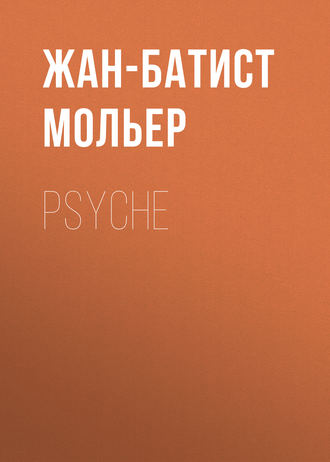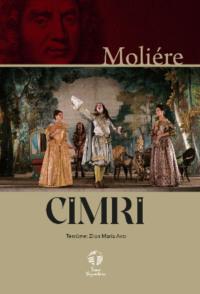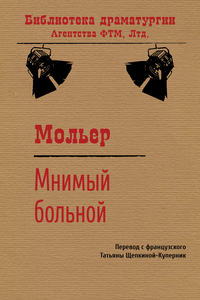 полная версия
полная версияPsyche

Molière
Psyche
PERSONS REPRESENTED
Jupiter.
Venus.
Love.
Zephyr.
Aegiale and Phaëne, two Graces.
The King.
Psyche.
Aglaura.
Cidippe.
Cleomenes and Agenor, two princes, Psyche's lovers.
Lycas, captain of the guards.
A River God
Two Cupids.
PROLOGUE
The front of the stage represents a rustic spot, while at the back the sea can be seen in the distance.
SCENE I
Flora. appears in the centre of the stage, attended by Vertumnus, god of trees and fruit, and by Palemon, god of the streams. Each of these gods conducts a troup of divinities; one leads in his train Dryads and Sylvans, and the other River Gods and Naiads.
Flora sings the following lines, to invite Venus to descend upon earth: —
Flora.
The din of battle is stayed;The mightiest king of earthHis arms aside has laid;Of peace 'tis now the birth!Descend thou, lovely Venus,And blissful hours grant us!Vertumnus and Palemon, and the divinities who attend them, join their voices to that of Flora, and sing the following words.—
Chorus of Divinities of the earth and streams, composed of Flora, Nymphs, Palemon, Vertumnus, Sylvans, Fauns, Dryads, and Naiads.
A peace profound we now enjoy,And games and bliss without alloy;Earth's mightiest king has giv'n us rest;To him be praise and thanks addrest.Descend thou, lovely Venus,And happy hours grant us!Then is formed an entry of the ballet, composed of two Dryads, four Sylvans, two River Gods, and two Naiads, after which Vertumnus and Palemon sing the following dialogue: —
Vertumnus.
Yield, yield, ye beauties stern,To sigh 'tis now your turn!Palemon.
See you, the queen above,She comes to breathe soft love!Vertumnus.
A fair one stern for ayeNe'er wins a faithful sigh!Palemon.
To woo has beauty arms,But gentleness has greater charms.Both (together).
To woo has beauty arms;But gentleness has greater charms.Vertumnus.
Seek not your hearts to shield;To pine is law, and ye must yield.Palemon.
Is aught more worthless bornThan hearts that love will scorn?Vertumnus.
A fair one stern, for ayeNe'er wins a faithful sigh!Palemon.
To woo has beauty arms,But gentleness has greater charms.Both (together).
To woo has beauty arms,But gentleness has greater charms.Flora answers the dialogue of Vertumnus. and Palemon. by the following minuet, and the other divinities join their dances to the song.
Does wisdom say,In youth's heyday,Sweet love forego?Be up, in hasteThese pleasures tasteOf earth below.Youth's wisdom tooIs love to woo,And love to know.If love disarms,It is by charms;So yield your arms.'Twere madness 'gainst his dartsTo seek to shield your hearts.Whate'er the bondOf lover fond,'Tis sweeter chainThan freedom's gain.Venus descends from heaven, attended by Cupid, her son, and two Graces, called Aegiale and Phaëne; and the divinities of the earth and the streams once more unite their songs, and continue by their dances to show their joy at her approach.
Chorus of all the Divinities of the earth and the streams.
A peace profound we now enjoy,And games and bliss without alloy;Earth's mightiest king has giv'n us rest;To him be praise and thanks addrest.Descend thou, lovely Venus,And happy hours grant us.Ven. (in her chariot). Cease, cease, all your songs of joy. Such rare honours do not belong to me, and the homage which in your consideration you now pay me ought to be reserved for lovelier charms. To pay your court to me is a custom indeed too old; everything has its turn, and Venus is no longer the fashion. There are rising charms to which now all carry their incense. Psyche, the beauteous Psyche, to-day has taken my place. Already now the whole world hastens to worship her, and it is too great a boon that, in the midst of my disgrace, I still find some one who stoops to honour me. Our deserts are not even fairly weighed together, but all are ready to abandon me; while of the numerous train of privileged graces, whose care and friendship followed me everywhere, I have now only two of the smaller ones who cling to me out of mere pity. I pray you, let these dark abodes lend their solitude to the anguish of my heart, and suffer me to hide my shame and grief in the midst of their gloom.
Flora and the other deities withdraw; and Venus with her retinue descends from her chariot.
SCENE II.
– VENUS, CUPID, AEGIALE, PHAËNE, CUPID
Aegi. We know not what to do, goddess; while we see you overwhelmed by this grief, our respect bids us be silent, our zeal would have us speak.
Ven. Speak; but if your cares would please me, leave all your advice for a fitter time; and speak of my wrath but to own me right; that was the keenest insult my divinity could ever receive; but revenge I shall have if gods have any power.
Pha. Your wisdom, your discernment, are greater than ours in deciding what may be worthy of you; yet, methinks, a mighty goddess should not thus give way to wrath.
Ven. That is the very reason of my extreme anger; the greater the brilliancy of my rank, the deeper the insult. If I did not stand on so lofty a height, the indignation of my heart would not be so violent. I, the daughter of the Thunderer, mother of the love-inspiring god; I, the sweetest yearning of heaven and earth, who received birth only to charm; I, who have seen everything that hath breath utter so many vows at my shrines, and by immortal rights have held the sovereign sway of beauty in all ages; I, whose eyes have forced two mighty gods to yield me the prize of beauty – I see my rights and my victory disputed by a wretched mortal. Shall the ridiculous excess of foolish obstinacy go so far as to oppose to me a little girl? Shall I constantly hear a rash verdict on the beauty of her features and of mine, and from the loftiest heaven where I shine shall I hear it said to the prejudiced world, "She is fairer than Venus"?
Aegi. This is the way with mortals, this is the style of mankind; they are impertinent in their comparisons.
Pha. In the century in which we live, they cannot praise without insulting great names.
Ven. Ah! how well does the insolent rigour of these words avenge Juno and Pallas, and comfort their hearts for the dazzling glory which the famous apple has won me. I see them rejoicing at my sorrow, assuming every moment a cruel smile, and with fixed gaze carefully seeking the confusion that lurks in my eyes. Their triumphant joy, when this affront is keenest felt, seems to tell me, "Boast, Venus, boast, the charms of thy features; by the verdict of one man was the victory made over us, but by the judgment of all, a mere mortal snatches it from you." Ah! that blow is the direst; it pierces my heart, I cannot bear its unequalled severity; the pleasure of my rivals is too great an addition to my poignant grief. My son, if ever my feelings had any weight with you, if ever I have been dear to you, if you bear a heart that can share the resentment of a mother who loves you so tenderly, use here your utmost power to support my interests, and cause Psyche to feel the shafts of my revenge through your own darts. To render her miserable, choose the dart that will please me most, one of those in which lurks the keenest venom, and which you hurl in your wrath. See that she loves, even to madness, the basest and lowest of mortals, and let her hear the cruel torture of love unreturned.
Cup. In the world nothing is heard but complaints of Cupid; everywhere a thousand freaks are laid to my charge, and you could not believe the evil and the foolish things which are daily said of me. If, to assist your wrath …
Ven. Be gone; no longer resist your mother's wishes; use reasoning only to find the shortest method of offering a sacrifice to my outraged glory. Let your departure be your only answer to my entreaties, and do not see my face again until you have avenged me.
Cupid flies off, and Venus withdraws with the two Graces. The scenery changes to a large town, with palaces and houses of different architecture on both sides of the stage.
ACT I
SCENE I
– AGLAURA, CIDIPPE.
Agl. My sister, there are sorrows which are rendered greater by keeping them to ourselves; let us speak freely of our joint distress, and give vent in our conversations to the poignant grief which fills our hearts. We are sisters in misfortune, and your heart and mine have so much in common that we can unite them, and in our just complaints murmur, with a common lament, against the cruelty of our fate. My sister, what secret fatality makes the whole world bow before our younger sister's charms? and how is it that, amongst so many different princes who are brought by fortune to this place, not one has any love for us? What! must we see them on all sides pressing forward to lay their hearts at her feet, whilst they pass our charms slightingly by? What spell has heaven cast over our eyes? What have they done to the gods that they are thus left without homage amidst all the glorious tribute of which others proudly boast? Can there be for us, my sister, any greater trial than to see how all hearts disdain our beauty, and how the fortunate Psyche insolently reigns with full sway over the crowd of lovers who ever attend her?
Cid. Ah! my sister, our fate is enough to bereave one of reason, and all the ills of nature are nothing in comparison.
Agl. At times I can almost shed tears over it; it takes away my happiness and my rest; my constancy finds itself powerless against such a misfortune; my mind is for ever dwelling over it, and the ill success of our charms and the triumph of Psyche are ever before my eyes. At night, unceasingly, comes to me the remembrance of it, and nothing can banish the cruel picture. As soon as sweet slumber comes to deliver me from it, it is immediately recalled to my memory by some dream which startles me from my sleep.
Cid. That is just what I suffer from, my sister. All that you say, I see myself, and you depict everything that I experience.
Agl. Well, let us discuss the matter. What all-powerful charms have been bestowed upon her? Tell me how, by the least of her looks, she has acquired honour in the great art of pleasing? What is there in her person that can inspire such passion? What right of sway over all hearts has her beauty given her? She has some comeliness, some of the brilliancy of youth; we are all agreed upon that, and I do not gainsay it. But must we yield to her because we are her seniors by a few years? Must we, therefore, consider ourselves quite commonplace? Are we made so as to excite derision? Have we no charms, no power of pleasing, no complexion, no good eyes, no dignity and bearing, by which we may win hearts? Do me the favour, sister, to speak to me frankly. Am I, in your opinion, so fashioned that my merit is below hers? And do you think that she surpasses me in her attire?
Cid. You, my sister? By no means. Yesterday, at the hunt, I compared you and her for a long time, and, without flattery, you appeared to me the more beautiful. But tell me truly, sister, without blandishment, am I deceiving myself when I think that I am so framed as to deserve the glory of a conquest?
Agl. You, my sister? You possess, without disguise, everything that can excite a loving passion. Your least actions are full of a charm which moves my soul. And I would be your lover if I were not a woman.
Cid. Whence comes it, then, that she bears off the palm from us; that, at the first glance, all hearts give up the struggle, and that no tribute of sighs and vows is paid to our loveliness?
Agl. All the women, with one voice, find her attractions but small; and, sister, I have discovered the cause of the number of lovers she holds in thrall.
Cid. I guess it. We may presume that some mystery is hidden under it. This secret of captivating everybody is not an ordinary effect of nature; the Thessalian art must be mixed up in it, and, doubtless, some one has given to her a charm by which she makes herself beloved.
Agl. My opinion is founded on a more solid basis, and the charms by which she draws all hearts to herself are a demeanour at all times free of reserve; caressing words and looks; a smile full of sweetness, which invites everyone, and promises them nothing but favours. Our glory is departed; and that lofty pride which, by a full observance of noble trials, exacted a proof of the constancy of our lovers, exists no longer. We have degenerated, and are now reduced to hope for nothing unless we throw ourselves into the arms of the men.
Cid. Yes, that is the secret; and I see that you understand it better than I. It is because we cling too much to modesty, sister, that no lovers come to us; it is because we try to sustain too strictly the honour of our sex and of our birth. Men, nowadays, like what comes easily to them; hope attracts them more than love; and that is how Psyche deprives us of all the lovers we see under her sway. Let us follow her example, and suit ourselves to the times; let us stoop, sister, to make advances, and let us no longer keep to those dull morals which rob us of the fruits of our best years.
Agl. I approve of this idea; and we have an opportunity of making a first trial of it upon the two princes who have last arrived. They are charming, sister, and to me their whole person… Have you noticed them?
Cid. Ah! Both are formed in such a mould that my soul… They are perfect, my sister.
Agl. I think we might seek their affections without dishonour to ourselves.
Cid. I think that, without shame, a beautiful princess might bestow her heart upon them.
Agl. Here they both are. I admire their manners and attire.
Cid. They in no way fall short of all that we have said of them.
SCENE II.
– CLEOMENES, AGENOR, AGLAURA, CIDIPPE.
Agl. Wherefore, princes, wherefore do you thus hasten away? Does our appearance fill you with fear?
Cle. We were led to believe, Madam, that the Princess Psyche might be here.
Agl. Has this place no longer any charm for you if it is not adorned by her presence?
Age. This place may be pleasant enough, but in our impatience we would find the Princess Psyche.
Cid. Something very important must doubtless be urging you both to seek her.
Cle. The motive is powerful enough, since our happiness depends entirely upon her.
Agl. Might we be allowed to inquire into the secret implied by these words?
Cle. We do not pretend to make a mystery of it. Indeed, it would show itself in spite of us; and the secret, Madam, does not last long when it is love.
Cid. Without further words, Princes, it means that you are both in love with Psyche.
Age. We are both under her sway, and we go with one accord to declare our passion to her.
Agl. It is certainly something quite new, and rather odd, to see two rivals so well agreed.
Cle. It is true that the thing is rare; but it is not impossible for two perfect friends.
Cid. In this spot, is she the only fair one, and can you find none other with whom to divide your admiration?
Agl. Amongst all the nobly born, is she the only one whom your eyes deem worthy of your tenderness?
Cle. Do we reason when we fall in love? Do we choose the object of our attachment? And when we bestow our hearts, do we weigh the right of the fair one to fascinate us?
Age. Without having the power of choosing, we follow in such a passion something which delights us; and when love touches a heart, we have no reasons to give.
Agl. Indeed, I pity the painful troubles to which I see your hearts expose themselves. You love one whose bright charms will mingle grief with the hopes they hold out to you, and whose heart will not fulfil all that her eyes promise.
Cid. The hope which calls you into the rank of her lovers will experience many disappointments in the favours she bestows; and the fitful changes of her inconstant heart will cause you many painful hours.
Agl. A clear discernment of your worth makes us pity the fate into which this passion will lead you; and if you wished, you could both find a more constant heart and charms as great.
Cid. A choice sweeter by half can rescue your mutual friendship from love; and there is such a rare merit apparent in you both that a gentle counsel would, out of pity, save your hearts from what they are preparing for themselves.
Cle. This generous advice shows us a kindness which touches our hearts; but heaven, madam, reduces us to the misfortune of not being able to profit by it.
Age. Your illustrious pity would in vain dissuade us from a love of which we both dread the result. What our friendship, Madam, has not done cannot be effected by any other means.
Cid. The power of Psyche must have … Here she is.
SCENE III.
– PSYCHE, CIDIPPE, AGLAURA, CLEOMENES, AGENOR.
Cid. Come, sister, and enjoy what is offered to you.
Agl. Prepare your charms to receive here a new triumph.
Cid. These two princes have both so well felt the power of your beauty that their lips are eager to declare it.
Psy. I little thought myself to be the cause of their pensiveness, and I should have expected it to be quite otherwise when I found them talking to you.
Agl. We have neither sufficient rank nor beauty to make us deserving of their love and solicitude, but they favour us with the honour of their confidence.
Cle. (to Psyche). The avowal which we would make to your divine charms, Madam, is, no doubt, a rash one; but so many hearts, on the point of expiring, are by such avowals obliged to displease you, that you have ceased to punish them by the terrors of your wrath. You see in us two friends who were joined in childhood by a happy similarity of feeling, and this tender union has been strengthened by a hundred contests of esteem and gratitude. The attachment of our friendship has been proved in the severe assaults of unfavourable fortune, the contempt of death, the sight of torture, and the glorious splendour of mutual good offices; but whatever trials it may have endured, to-day witnesses its greatest triumph, and nothing proves so much its tried fidelity as its duration through the rivalry of love. Yes, in spite of so many charms, its constancy subjects our vows to the laws it gives us. It comes with sweet and entire deference, to submit the success of our passion to your choice; and, to give a weight to our competition which may bring the balance of state reasons to favour the choice of one of us, this friendship intends of free will to unite our two estates to the fortune of the happy one.
Age. Yes, Madam, we wish to make of these two estates, which we propose to unite under your happy choice, a help towards obtaining you. The sacrifice which we make to the king, your father, in order to ensure this happiness, has nothing difficult in it to our loving hearts, and it will be a necessary gift that the rejected unfortunate should make over to the one who is fortunate a power which he will no longer know bow to enjoy.
Psy. Princes, you both display to my eyes a choice so precious and dazzling that it would satisfy the proudest heart. But your passion, your friendship, your supreme virtue, all increase the value of your vows of fidelity, and make it a merit that I should oppose myself to what you ask of me. I must not listen to my heart only before engaging in such a union, but my hand must await my father's decision before it can dispose of itself, and my sisters have rights superior to mine. But if I were referred absolutely to my own wishes, you might both have too great a share in them, and my entire esteem be so evenly balanced between you that I should not be able to decide in favour of either. I would indeed respond with most affectionate interest to the ardour of your suit, but amid so much merit two hearts are too much for me, one heart too little for you. The accomplishment of my dearest wishes would be to me a burden were it granted to me by your love. Yes, Princes, I should greatly prefer you to all those whose love will follow yours, but I could never have the heart to prefer one of you to the other. My tenderness would be too great a sacrifice to the one whom I might choose, and I should think myself barbarously unjust to inflict so great a wrong upon the other. Indeed, you both possess such greatness of soul that it would be wrong to make either of you miserable, and you must seek in love the means of being both happy. If your hearts honour me enough to give me the right of disposing of them, I have two sisters well fitted to please, who might make your destinies happy, and whom friendship endears to me enough for me to wish that you should be their husbands.
Cle. Can a heart whose love, alas! is extreme, consent to be given away by her it loves? We yield up our two hearts, Madam, to your divine charms, even should you doom them to death; but we beg you not to make them over to any one but yourself.
Age. It would be too unjust to the princesses, Madam, and too poor a tribute to their charms, if we should give to them the remains of a former affection. Only the faithful purity of a first love deserves to aspire to the honour to which your kindness invites us, for each of your sisters merits a love which has sighed for her alone.
Agl. It seems to me, Princes, without any offence, that before thus refusing, you might wait until our intentions had been declared. Do you think our hearts so susceptible and tender? And when people propose your offering yourselves to us, are you so sure of being accepted?
Cid. I think our sentiments are lofty enough to lead us to refuse a heart which wants soliciting; and we wish to conquer our lovers by the power of our own merit.
SCENE IV.
– PSYCHE, AGLAURA, CIDIPPE, CLEOMENES, AGENOR, LYCAS.
Lyc. (to Psyche). Ah! Madam!
Psy. What is the matter?
Lyc. The king …
Psy. What?
Lyc. Requests your presence.
Psy. What am I to augur from your agitation?
Lyc. You will know it only too soon.
Psy. Alas! how you excite my fears about the king!
Lyc. Fear only for yourself; you are the one to be pitied.
Psy. I can praise heaven, and be no longer anxious, when I know that I am the only one in danger. But tell me, Lycas, what alarms you.
Lyc. Suffer me, Madam, to obey him who sent me hither; and I beg of you, learn from his lips what troubles me thus.
Psy. Let us go and hear what this is which makes them fear that my courage will fail me.
SCENE V.
– AGLAURA, CIDIPPE, LYCAS.
Agl. If your orders do not extend to us, tell us what great misfortune is hidden under your sadness.
Lyc. Alas! hear for yourselves, princesses, the great misfortune which is known to the whole court. These are the very words which, through the oracle, destiny has spoken to the king, and which grief, Madam, has engraven on my heart: —
"No one must think to leadPsyche to Hymen's shrine;But all with earnest speed,In pompous mournful line,High to the mountain crestMust take her; there to await,Forlorn, in deep unrest,A monster who envenoms all,Decreed by fate her husband;A serpent whose dark poisonous breathAnd rage e'er hold the world in thrall,Shaking the heavens high and realms of death."After so severe a decree, I leave you to judge for yourselves if the gods could have manifested their wrath in a more cruel and fearful manner.
SCENE VII.
– AGLAURA, CIDIPPE.
Cid. How does this sudden misfortune into which destiny has plunged Psyche affect you, sister?
Agl. But how does it affect you, sister?
Cid. To speak the truth, my heart is not very much grieved at it.
Agl. My heart feels something which very much resembles joy. Let us go; Fate has sent us a calamity which we can consider as a blessing.









